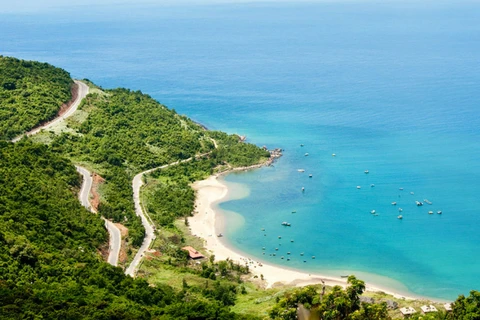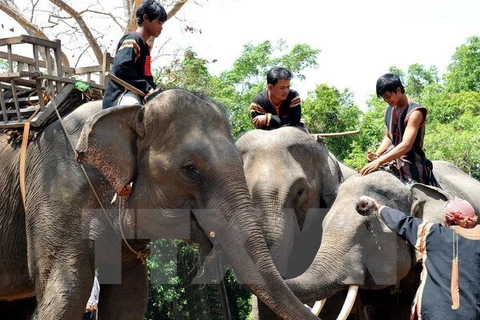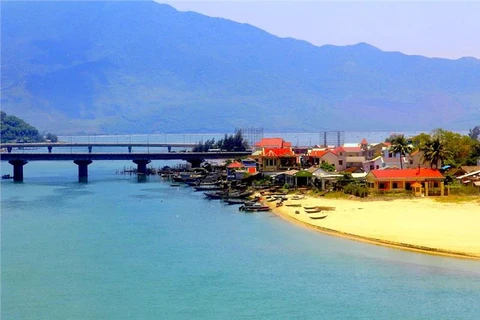Da Nang (VNA) - Four cities in Vietnam – Hue, Da Nang, Hoi An and Dong Ha – have agreed to enter World Wild Fund for Nature (WWF)’s One Planet City Challenge programme to show how cities can be a hub for creativity, ambition and innovation in dealing with climate change.
A WWF statement on March 22 said cities generate 70 percent of the world’s carbon emissions, and WWF’s One Planet City Challenge is a biennial competition that recognises and rewards cities for developing infrastructure, housing, transport and mobility solutions to power the global transition to a low-carbon, climate-resilient future.
“Cities can be the blueprint and inspiration for a sustainable world,” said Marco Lambertini, Director General of WWF International.
“Progressive climate policy by local governments can radically reduce the impact of transport, housing and other high-emitting sectors and deliver greener, healthier and more livable cities and homes for people.”
The One Planet City Challenge was designed by WWF to mobilise action and support from cities in global climate efforts, including the goals now set forth by the Paris Agreement.
Open for participation to cities in 25 countries this year, the competition invites interested cities to register at the carbon Climate Registry (cCR), the leading global climate reporting platform for local and subnational governments managed by ICLEI — Local Governments for Sustainability.
"Active reporting is an important way for local governments to prove they are major players in global climate efforts," said Gino Van Begin, Secretary General of ICLEI. "Since the carbon Climate Registry was launched, we have seen over 700 cities, towns, states and regions from across the world reporting more than 6,100 mitigation and adaptation commitments."
Last year, for the first time, Vietnam had Hue join the City Challenge and also be one of 18 in the world to be a National Earth Hour City. To gain that honour, Hue submitted a target of decreasing greenhouse gas emissions by 20 percent from 2011 emission levels by 2020, along with six action plans focusing on urban greening, green tourism development, effective disposal of trash and wastewater, intelligent public lighting systems, renewable energy and use of environmentally friendly construction materials.
This year, Da Nang, Hoi An city in Quang Nam province and Dong Ha city in Quang Tri province have committed to enter the OPCC 2017-18.
Commitments and action plans for each city will be developed and ready to be submitted this September, with technical support from WWF-Vietnam.
“We feel so proud and inspired by the commitment and passion of these cities towards low-carbon development, which is now a global trend, and also welcome more cities joining WWF in the OPCC 2017-2018.
“We have always admired other cities such as Amsterdam for its innovative policy to encourage public transportation or Seoul for its remarkable ambition in using renewable energy, but now we can be proud that our cities are already taking concrete action with specific and measurable results to fight against climate change,” said Pham Cam Nhung, Energy Practice head of WWF-Vietnam.
Entrants will be evaluated by an international jury of experts on areas ranging from urban planning and transport to consumer behaviour and energy systems. The most ambitious cities will be recognised as national winners, and, from among these, one city will be crowned the global winner of the One Planet City Challenge.
WWF will profile the winning cities’ achievements in a global digital campaign designed to strengthen public support for city-led climate action.
This year marks the 5th anniversary of the competition, formerly known as the Earth Hour City Challenge, which has engaged over 320 cities across five continents since its inception.
Submissions will be evaluated on the below criteria outlined by WWF.
There will also be a special focus on level of ambition and ability to deliver on commitments and transformational change; ability to integrate actions into coherent and overarching climate action plans; determination to align with a transparent, science-based GHG emission reduction trajectory; and innovative approaches to addressing urban mobility.-VNA
A WWF statement on March 22 said cities generate 70 percent of the world’s carbon emissions, and WWF’s One Planet City Challenge is a biennial competition that recognises and rewards cities for developing infrastructure, housing, transport and mobility solutions to power the global transition to a low-carbon, climate-resilient future.
“Cities can be the blueprint and inspiration for a sustainable world,” said Marco Lambertini, Director General of WWF International.
“Progressive climate policy by local governments can radically reduce the impact of transport, housing and other high-emitting sectors and deliver greener, healthier and more livable cities and homes for people.”
The One Planet City Challenge was designed by WWF to mobilise action and support from cities in global climate efforts, including the goals now set forth by the Paris Agreement.
Open for participation to cities in 25 countries this year, the competition invites interested cities to register at the carbon Climate Registry (cCR), the leading global climate reporting platform for local and subnational governments managed by ICLEI — Local Governments for Sustainability.
"Active reporting is an important way for local governments to prove they are major players in global climate efforts," said Gino Van Begin, Secretary General of ICLEI. "Since the carbon Climate Registry was launched, we have seen over 700 cities, towns, states and regions from across the world reporting more than 6,100 mitigation and adaptation commitments."
Last year, for the first time, Vietnam had Hue join the City Challenge and also be one of 18 in the world to be a National Earth Hour City. To gain that honour, Hue submitted a target of decreasing greenhouse gas emissions by 20 percent from 2011 emission levels by 2020, along with six action plans focusing on urban greening, green tourism development, effective disposal of trash and wastewater, intelligent public lighting systems, renewable energy and use of environmentally friendly construction materials.
This year, Da Nang, Hoi An city in Quang Nam province and Dong Ha city in Quang Tri province have committed to enter the OPCC 2017-18.
Commitments and action plans for each city will be developed and ready to be submitted this September, with technical support from WWF-Vietnam.
“We feel so proud and inspired by the commitment and passion of these cities towards low-carbon development, which is now a global trend, and also welcome more cities joining WWF in the OPCC 2017-2018.
“We have always admired other cities such as Amsterdam for its innovative policy to encourage public transportation or Seoul for its remarkable ambition in using renewable energy, but now we can be proud that our cities are already taking concrete action with specific and measurable results to fight against climate change,” said Pham Cam Nhung, Energy Practice head of WWF-Vietnam.
Entrants will be evaluated by an international jury of experts on areas ranging from urban planning and transport to consumer behaviour and energy systems. The most ambitious cities will be recognised as national winners, and, from among these, one city will be crowned the global winner of the One Planet City Challenge.
WWF will profile the winning cities’ achievements in a global digital campaign designed to strengthen public support for city-led climate action.
This year marks the 5th anniversary of the competition, formerly known as the Earth Hour City Challenge, which has engaged over 320 cities across five continents since its inception.
Submissions will be evaluated on the below criteria outlined by WWF.
There will also be a special focus on level of ambition and ability to deliver on commitments and transformational change; ability to integrate actions into coherent and overarching climate action plans; determination to align with a transparent, science-based GHG emission reduction trajectory; and innovative approaches to addressing urban mobility.-VNA
VNA
























